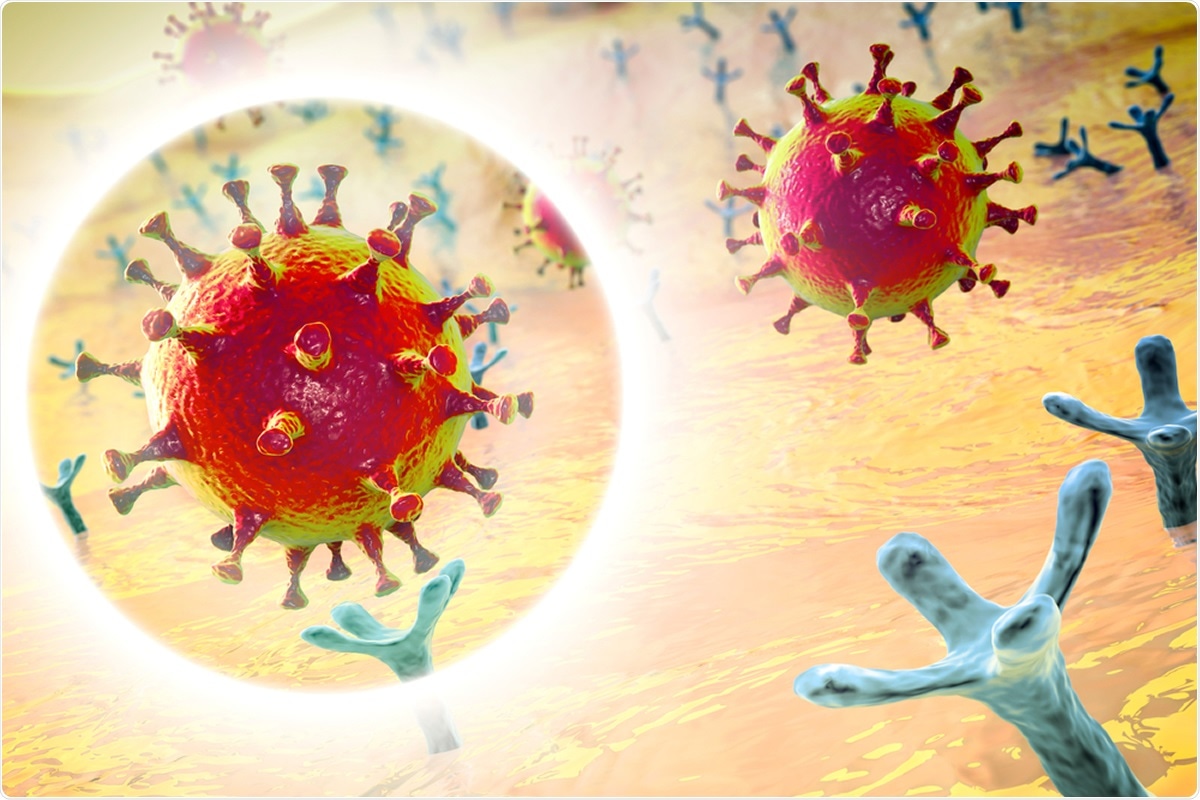As the coronavirus pandemic evolves, vaccine development has come a long way. From the more than a hundred candidate vaccines developed by a multitude of companies, scientists, and institutions, more than 29 vaccines are now in clinical evaluation.

Image Credit: SARS-CoV-2 viruses binding to ACE-2 receptors on a human cell. Image Credit: Kateryna Kon / Shutterstock
Now, a novel experimental vaccine that is made from a mild virus genetically-modified to carry an essential gene from the severe acute respiratory syndrome coronavirus 2 (SARS-CoV-2), the virus that causes the coronary disease (COVID-19), has shown promise in preventing pneumonia in mice infected with the virus.
A team of scientists from the Washington University School of Medicine in St. Louis has joined a string of other institutions and experts in the race to developing the first-ever vaccine for SARS-CoV-2, which has infected a staggering 20.84 million people and taken over 754,000 lives worldwide. Their research is reported in the journal Cell Host and Microbe.
“Unlike many of the other vaccines under development, this vaccine is made from a virus that is capable of spreading in a limited fashion inside the human body, which means it is likely to generate a strong immune response,” Dr. Herbert S. Gasser, Professor of Medicine and a professor of molecular microbiology, and pathology and immunology said.
“Since the virus is capable of replicating, it can be grown to high levels in the lab, so it’s easy to scale up and should be more cost-effective than some of the other vaccine candidates. So, while what we have shown is just proof of concept, I think it’s very promising. Our vaccine candidate is now being tested in additional animal models to get it into clinical trials as soon as possible,” he added.
The vaccine
The vaccine, known as the replication-competent vesicular stomatitis virus (VSV) expressing a modified form of the SARS-CoV-2 spike gene in place of the native glycoprotein gene (VSV-eGFP-SARS-CoV-2), has shown the generation of neutralizing immune responses that helped protect laboratory mice from COVID-19 infection.
The scientists developed the vaccine by genetically engineering vesicular stomatitis virus (VSV), a virus that affects livestock and leads to a mild and short-lived illness in humans. To create the vaccine, the team swapped out one gene from VSV for the gene for the Spike protein from SARS-CoV-2.
The spike protein is believed to be one of the significant pathways to immunity against SARS-CoV-2 infection, which uses the spike to latch and bind onto human cells. It binds to human angiotensin-converting enzyme 2 (ACE2), which acts as the entry point of the virus to infect and invade healthy human cells.
By combining the gene for the spike to a harmless virus, the team formulated a hybrid virus that can help people produce an immune response against SARS-CoV-2 and stem the spread of the virus across the globe.
The mice exhibited high antibody titers that neutralize SARS-CoV-2 and target the receptor-binding domain that engages ACE2.
Trying it out
The same method was used to develop Ervebo, the first FDA-approved vaccine for the prevention of Ebola virus disease (EVD), which was approved in December 2019. The vaccine was developed by adding the same VSV virus and genetically modifying a gene from the Ebola virus. The vaccine was used to administer to residents in Africa, North America, and Europe. It was responsible for the fast control of the 2018 to 2020 Ebola outbreak in the Democratic Republic of Congo.
Now, the researchers injected the novel coronavirus vaccine into laboratory mice. A control group received a lab strain of VSV, while a subgroup was had a booster shot of the candidate vaccine four weeks after the initial injections.
After three weeks, the team obtained blood samples to test for the presence of antibodies. They found that there are high levels of neutralizing antibodies after one dose, and these increased 90-fold when the mice were given a second dose.
A challenge test was conducted where the mice were exposed to the SARS-CoV-2 five weeks after their last dose. The vaccine protected the mice from pneumonia, one of the major complications of COVID-19, which can progress to acute respiratory distress syndrome (ARDS) and death.
By about four days after the infection with the virus, there were no detectable virus particles in the lungs of the mice, both in the one-dose and two-doses groups. Further, the mice that received the placebo had high levels of the virus in their lungs. Those injected with the vaccine had fewer signs of inflammation and damage in the lungs than those in the control group.
“If the vaccine also protects those animals from COVID-19, the next step would be to scale up production under what the Food and Drug Administration refers to as “good manufacturing practice (GMP) conditions,” the team said, noting that human trials will be conducted next to prove that the experimental vaccine is safe and effective in humans.
Sources:
Journal reference: